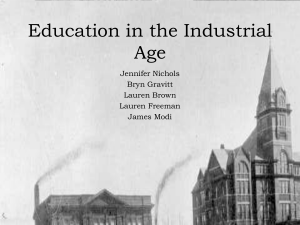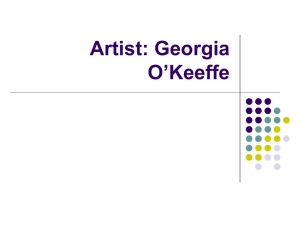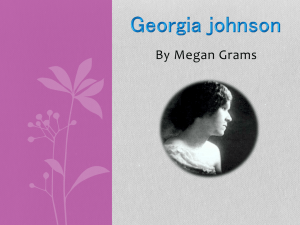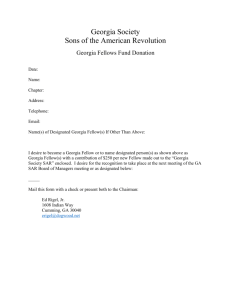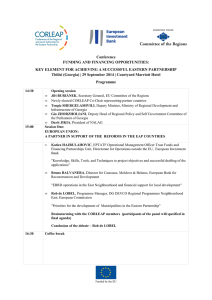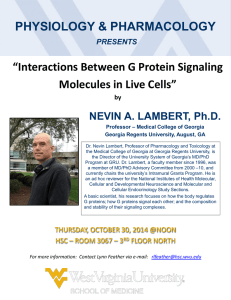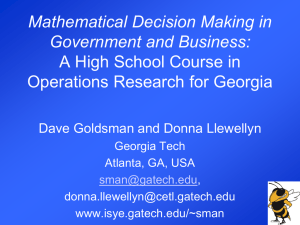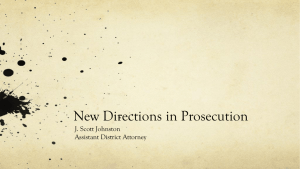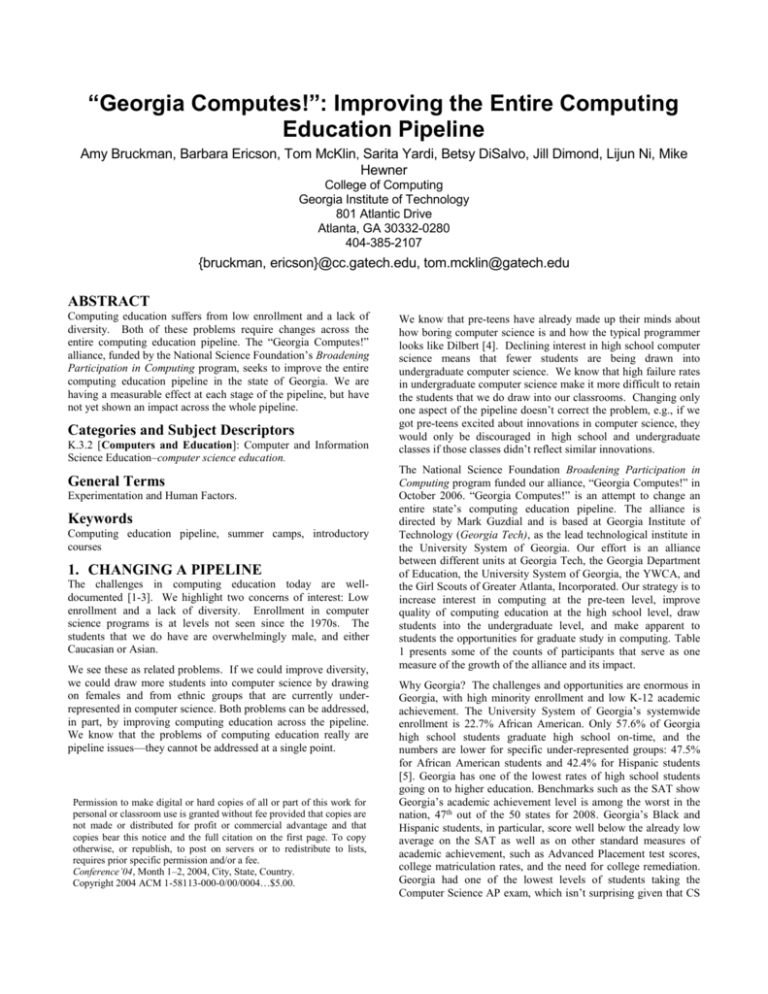
“Georgia Computes!”: Improving the Entire Computing
Education Pipeline
Amy Bruckman, Barbara Ericson, Tom McKlin, Sarita Yardi, Betsy DiSalvo, Jill Dimond, Lijun Ni, Mike
Hewner
College of Computing
Georgia Institute of Technology
801 Atlantic Drive
Atlanta, GA 30332-0280
404-385-2107
{bruckman, ericson}@cc.gatech.edu, tom.mcklin@gatech.edu
ABSTRACT
Computing education suffers from low enrollment and a lack of
diversity. Both of these problems require changes across the
entire computing education pipeline. The “Georgia Computes!”
alliance, funded by the National Science Foundation’s Broadening
Participation in Computing program, seeks to improve the entire
computing education pipeline in the state of Georgia. We are
having a measurable effect at each stage of the pipeline, but have
not yet shown an impact across the whole pipeline.
Categories and Subject Descriptors
K.3.2 [Computers and Education]: Computer and Information
Science Education–computer science education.
General Terms
Experimentation and Human Factors.
Keywords
Computing education pipeline, summer camps, introductory
courses
1. CHANGING A PIPELINE
The challenges in computing education today are welldocumented [1-3]. We highlight two concerns of interest: Low
enrollment and a lack of diversity. Enrollment in computer
science programs is at levels not seen since the 1970s. The
students that we do have are overwhelmingly male, and either
Caucasian or Asian.
We see these as related problems. If we could improve diversity,
we could draw more students into computer science by drawing
on females and from ethnic groups that are currently underrepresented in computer science. Both problems can be addressed,
in part, by improving computing education across the pipeline.
We know that the problems of computing education really are
pipeline issues—they cannot be addressed at a single point.
Permission to make digital or hard copies of all or part of this work for
personal or classroom use is granted without fee provided that copies are
not made or distributed for profit or commercial advantage and that
copies bear this notice and the full citation on the first page. To copy
otherwise, or republish, to post on servers or to redistribute to lists,
requires prior specific permission and/or a fee.
Conference’04, Month 1–2, 2004, City, State, Country.
Copyright 2004 ACM 1-58113-000-0/00/0004…$5.00.
We know that pre-teens have already made up their minds about
how boring computer science is and how the typical programmer
looks like Dilbert [4]. Declining interest in high school computer
science means that fewer students are being drawn into
undergraduate computer science. We know that high failure rates
in undergraduate computer science make it more difficult to retain
the students that we do draw into our classrooms. Changing only
one aspect of the pipeline doesn’t correct the problem, e.g., if we
got pre-teens excited about innovations in computer science, they
would only be discouraged in high school and undergraduate
classes if those classes didn’t reflect similar innovations.
The National Science Foundation Broadening Participation in
Computing program funded our alliance, “Georgia Computes!” in
October 2006. “Georgia Computes!” is an attempt to change an
entire state’s computing education pipeline. The alliance is
directed by Mark Guzdial and is based at Georgia Institute of
Technology (Georgia Tech), as the lead technological institute in
the University System of Georgia. Our effort is an alliance
between different units at Georgia Tech, the Georgia Department
of Education, the University System of Georgia, the YWCA, and
the Girl Scouts of Greater Atlanta, Incorporated. Our strategy is to
increase interest in computing at the pre-teen level, improve
quality of computing education at the high school level, draw
students into the undergraduate level, and make apparent to
students the opportunities for graduate study in computing. Table
1 presents some of the counts of participants that serve as one
measure of the growth of the alliance and its impact.
Why Georgia? The challenges and opportunities are enormous in
Georgia, with high minority enrollment and low K-12 academic
achievement. The University System of Georgia’s systemwide
enrollment is 22.7% African American. Only 57.6% of Georgia
high school students graduate high school on-time, and the
numbers are lower for specific under-represented groups: 47.5%
for African American students and 42.4% for Hispanic students
[5]. Georgia has one of the lowest rates of high school students
going on to higher education. Benchmarks such as the SAT show
Georgia’s academic achievement level is among the worst in the
nation, 47th out of the 50 states for 2008. Georgia’s Black and
Hispanic students, in particular, score well below the already low
average on the SAT as well as on other standard measures of
academic achievement, such as Advanced Placement test scores,
college matriculation rates, and the need for college remediation.
Georgia had one of the lowest levels of students taking the
Computer Science AP exam, which isn’t surprising given that CS
AP was available in less than 10% of the public high schools in
the state when we started. If we can make a difference in Georgia,
with everything else working against us, we’ll have a significant
model for others to adopt and adapt.
Table 1: Counts describing participation in Georgia
Computes! activities
YWCA Workshops
Girl Scouts
Computing
Workshops
HCI Camps
Pipeline
K-12
K-12
K-12
CS AP Teachers
Teachers
K-12
Faculty Workshops
Faculty
Summer Workshops
(260 unique
teachers have taken
one or more
workshops with us)
Summer Camps at
Colleges and
Universities
Teachers
Institutions
Years
Num
2006-2007
30
2007-2008
40
2005-2006
190
2006-2007
372
2007-2008
1300
2007
10
2008
15
2003-2004
44
2007-2008
87
2007
14
2008
14
2004
40
2005
72
2006
79
2007
82
2008
92
2006
1
2007
4
2008
8
2. STARTING EARLY
We work with the YWCA’s afterschool Teen Girls in Technology
program in Atlanta to reach out to middle school girls. The
students served by the YWCA program are predominantly
African-American.
The YWCA program is staffed with
undergraduate and graduate students from Georgia Tech who
serve as mentors and teachers to the students. We hire student
mentors who are female and who are members of
underrepresented groups, to serve as role models. . We sponsored
an all-female, majority African American YWCA team to
compete in the LEGO FIRST competition (Figure 1).
The Girl Scouts of Greater Atlanta, Inc. has a membership of
40,000 girls in grades K-12 comprising rural, suburban, and urban
Georgia. We offer Saturday computing workshop and summer
camp sessions where students explicitly explore computing
concepts through tools like Alice, PicoCrickets, LEGO robots,
and Scratch.
Our Girl Scout workshops have been growing extremely fast. We
started working with the Girl Scouts during 2005-2006. That year
about 190 girls had some introduction to computing with LEGO
robots. In 2006-2007 327 girls had some introduction to
computing with LEGO robots or Alice. In 2007-2008 over 1300
girls had some introduction to computing using LEGO robots,
Scratch, PicoCrickets, or Alice. Our Saturday workshops grew
from 20 girls at a time to 65 girls at a time. We also offered three
short workshops for majority-Hispanic Girl Scout troops at a local
elementary school.
The results of these activities have been overwhelmingly positive.
Tom McKlin is the external evaluator on the team. The Saturday
computing workshops are only four hours long but despite the
short period of time, he has found statistically significant
improvements in students’ attitudes about computing in response
to survey questions like “Computer jobs are boring,” “Girls can
do computing,” and “Programming is hard.” Of 29 workshops
where we have both pre-surveys and post-surveys, 18 of the
workshops had a statistically significant improvement (using
Mann-Whitney U-Test, with p < 0.10) in participants’ attitudes
about computing.
From previous work [4], we know that student attitudes about
computing are set early on. During middle school, students make
up their minds about whether computer science is worth
exploring, or not. It is important for any pipeline effort to start at
least that early.
Our aim in reaching out to students at these ages is to provide
them with a broad definition of what is computing. We have
students engage in storytelling using Carnegie Mellon’s Alice
[6,7], explore robot programming with LEGO robot kits, engage
in digital arts and crafts using PicoCrickets, and create animations
and video games using MIT’s Scratch [8]. In some of our settings,
students start programming in languages like Python, if there is
sustained enough use and support to move into more traditional
computing activities.
We had been offering summer computing camps to high school
(started 2004) and middle school students (started 2006) in the
Atlanta area. These camps have been highly successful—so
successful, in fact, that we are completely full, all summer long,
with multiple sessions of each.
Through our “Georgia
Computes!” alliance, we are helping other University System
schools to offer camp. This is discussed further in Section 4.
Figure 1: An All-Female, majority African-American LEGO
FIRST team, sponsored by "Georgia Computes!" and a first
for the Atlanta YWCA TGI-Tech Program.
3. HIGH SCHOOL
The “Georgia Computes!” alliance includes Georgia Tech’s
Institute for Computing Education (ICE@GT). ICE@GT is a
collaboration between Georgia’s Department of Education and
Georgia Tech. The state wanted to grow the number of computer
science teachers in the state, with a particular emphasis on
developing Computer Science (CS) Advanced Placement (AP)
teachers. The state’s strategy was to teach existing high school
teachers how to teach computer science.
coordinators. The program seeks to improve the teaching-related
communication and leadership skills of Georgia Tech graduate
students and to use the exceptional scholarly expertise available at
Georgia Tech to assist in increasing the mathematics, science, and
computing performance of Atlanta-area school students. “Georgia
Computes!” funds STEP students to work in CS teachers’
classrooms.
ICE@GT developed a multi-year plan for developing high school
teachers, even without previous computer science experience, into
CS AP teachers [9]. During the first summer, teachers enroll in a
one week summer workshop where they learn to teach an
introductory computing course using LEGO robots, Scratch
and/or Alice. Teachers should teach that course for at least one
year and then take a beginning programming in Java workshop.
We use the Media Computation approach [10] which has worked
successfully with liberal arts and management (Business) majors
(some MediaComp cite)—the most common majors of existing
Georgia high school computing teachers [11,12]. The teachers are
expected to teach beginning programming for a year or more.
During years three and four, the teachers take summer workshops
in teaching intermediate programming and then CS AP. The
combination of four years of experience teaching computing, with
in-service workshops, plus summer workshops, can successfully
help teachers to become CS AP teachers.
Figure 2: Percentage of High Schools teaching CS AP in
Georgia and neighboring states
Figure 3: AP CS Test-Takers by County in Georgia. Note
increase beyond the central Atlanta counties.
Our goal for “Georgia Computes!” was to increase the number of
CS AP teachers by 50% over the three years of our NSF BPC
grant. By year two of the project, the number of CS AP teachers
in Georgia had increased by 78%. Georgia has a higher
percentage of high schools teaching CS AP than any state in the
Southeast (Figure 2). While we can’t claim that “Georgia
Computes!” and ICE@GT alone accounted for that increase, the
broad reach of the increase to counties far away from Atlanta,
where most CS AP initiatives have been based, suggests that
“Georgia Computes!” has had a significant role in this change
(Figure 3).
4. UNDERGRADUATE
In addition to supporting high school teachers with training, we
provide teachers direct support in their classrooms with student
supporters. Marion Usselman is working with us from Georgia
Tech’s Center for Education Integrating Science, Mathematics,
and Computing (CEISMC), where she is the co-PI on a Student
and Teacher Enhancement Partnership (STEP) NSF GK-12
program. CEISMC is the educational outreach center at Georgia
Tech. The STEP program, now in its sixth year, partners advanced
undergraduate and graduate student fellows (from fields supported
by the National Science Foundation) for ten hours per week with
metro-Atlanta area high school science, mathematics, and
technology (STEM) teams that are led by master teacher-
The University System of Georgia (USG) consists of 35 public
colleges and universities, overseen by a single Board of Regents
and Chancellor. The University System includes two year, four
year, and research universities. Not all 35 institutions offer degree
programs in computing.
Those institutions that do offer
computing programs have representatives on the Academic
Advisory Committee on the Computing Disciplines (AACCD).
“Georgia Computes!” works directly with the AACCD, e.g.,
offering workshops at an AACCD meeting, and contacting
AACCD representatives for available programs and workshops.
Our efforts at the undergraduate level are of two types:
We explicitly offer workshops to teach Georgia
university CS faculty how to offer innovative
undergraduate classes that match (in context and
motivation) the kinds of activities we are using at the
pre-teen and high school levels.
We offer training and seed-funding to help University
faculty in offering middle school and high school
student camps, like the ones offered at Georgia Tech.
4.1 Faculty Workshops
“Georgia Computes!” has offered a half dozen workshops in a
year and half to USG CS faculty. Our first workshop was a halfday workshop following an AACCD meeting in February 2007.
Since then, we have offered workshops in two day and three day
formats in Atlanta (on both weekends, and during summers), and
a four day workshop at the Georgia Southern University, to reach
faculty in the south part of the state.
The focus of the workshops is to provide faculty with resources
and ideas to teach introductory computer science in the
contextualized approaches that we are using successfully at the
earlier stages in the pipeline.
We demonstrate teaching
introductory computing with media, robotics, and engineering,
using a variety of languages (Python, Java, and MATLAB).
These approaches have been shown to improve retention at
Georgia Tech and at other schools [12]. We provide teachers with
materials (e.g., example texts, homework assignments, lecture
slides) including infrastructure support (e.g., materials to evaluate
their own classes, websites and mailing lists for additional support
and collaboration with other teachers). The goal of the workshops
is to support teachers in adapting these materials for their schools
and contexts.
Three-fourths of the state’s Universities offering some kind of
computing program have now had at least one faculty member
take one of our workshops. In a study of USG faculty who
attended our workshops in summer 2007, ½ of all faculty who
attended reported adopting some of the materials in their classes
[13]
4.2 Summer Workshops
As mentioned, the middle school and high school summer camps
at Georgia Tech are completely full. While we could look for
ways to expand the camps at Georgia Tech, we can have broader
and more effective impact on the state’s computing education
pipeline by helping other USG institutions to offer their own
middle school and high school student summer camps. Camps at
colleges and universities across the state that draw from their own
regional school districts will have an added advantage in
recruiting those local students into their degree programs.
We offer faculty workshops on “How to Run a Summer Camp.”
Each fall we offer a one day workshop on the logistics of running
a camp, e.g., how to advertise, the kinds of permission and
consent forms required, and how to put together a sustainable
business model. In the spring, we offer a two day workshop on the
camp curricula that has been used at Georgia Tech.
We offer seed grants for up to $5,000 to up to four USG
institutions a summer. We ask institutions to create an application
that describes the camp in detail, including the financial plan and
how the seed grant will be used. We encourage institutions to
develop a plan where the camp fees sustain the camp, and the seed
grant can be used as initial funding as a source for purchasing
materials, like robot kits or PicoCricket kits. We ask institutions
what they will do with their kits during the academic year, with
explicit encouragement to use the kits as a lending library to local
middle and high schools—thus creating another connection
between the institutions and the local schools.
We have funded seven new summer camp programs around the
state through “Georgia Computes!” These range in type from a
focus on robotics to a broad focus on mathematics and computing.
We require the funded camps to be part of our evaluation effort,
and analysis of their surveys is still on-going.
5. GRADUATE
Georgia Tech’s College of Computing is the leader in graduate
computing education for the University System of Georgia and is
a national leader in creating graduate computing education that
has a more diverse population. We offer two non-traditional-CS
graduate degrees that emphasize the relevance of computing in
everyday settings. The MS in Human-Computers in Interactions
involves students in classes in computing, psychology, new
media, and industrial design, and has been female-majority. The
PhD in Human-Centered Computing (PhD in HCC emphasizes
the study of computing for humans through the lens of
psychology, sociology, learning sciences, and cognitive science,
and has always been female-majority.
Through our use of role models in various programs, we seek to
get more diverse graduate students in front of prospective
students. We want to broaden the definition of computing for
these prospective students to include HCI and HCC as targets.
While we also want students to consider the traditional CS
graduate programs, we do not want students to reject graduate
study in computing because they may think that the traditional
view is the only one available.
6. CHALLENGES AND OPPORTUNITIES
While each of our individual efforts seems to be having impact,
we have not yet shown effects throughout the pipeline. Part of the
problem is simply the short time of our effort. In the two years of
“Georgia Computes!” we can hardly expect our pre-teens, whose
attitudes have been changed about computing, to have even
completed high school, let alone entered undergraduate or
graduate study in computing. Nonetheless, there are changes that
we might expect which we would like to track—and yet are
finding roadblocks to gathering this data.
One of these challenges is capturing data about enrollment in
computing programs across the state of Georgia. We believe that
our efforts at the high school level should be influencing
undergraduate computing enrollment, and that our efforts to
innovate in computing curriculum should be having an effect on
retention rates around the state. How do we gather data from 30+
individual institutions, with different degree programs and
different course numberings (and meanings)? Our original hope
was to the USG’s own “Data Warehouse” which gathers detailed
data from every USG institution on its enrollment. However, we
discovered that the “Data Warehouse” does not map all data to a
central format—rather, it stores 35 separate databases in 35
separate formats. We are now engaged in the tedious process of
learning the mappings between course meanings at all relevant
institutions and how to gather data from each individually.
While the challenges are large, so are the opportunities. The
interactions in “Georgia Computes!” have created opportunities
for new interventions and new research. Here are two brief
examples of these kinds of opportunities.
6.1 Research at a Girl Scout Summer Camp
Each of the last two summers, we have had the opportunity to
place a Georgia Tech student at a Girl Scout Summer Camp to
teach computing. Girls could take robotics or animation as a
summer camp activity, along with horseback riding and
swimming. In this way, we give girls a chance to interact with
technology outside of a classroom context, in a leisurely setting.
During Summer 2008, one of the HCC Ph.D. students, Jill
Dimond, used the opportunity to trial a new approach to teaching
computing. She taught the girls to design and build chat tools for
the OLPC XO laptop to be used in the developing world. The
response was terrific—she had to hold two sessions daily, rather
than the one she planned, because of the number of girls
interested. This kind of activity furthered Jill’s research and
offered the girls a new model for what graduate students in
computing might do.
6.2 Beyond the Girls at the YWCA
Betsy diSalvo is an HCC Ph.D. student who was already a
successful educational innovator and researcher before she started
our program. She joined the “Georgia Computes!” effort, and
visited our YWCA afterschool programs. She decided to focus
her attention on African-American boys who were not being
reached through our YWCA program.
She is starting a new effort to build on the interest of many
African-American boys in console video games on sports. She is
trying to engage the boys in becoming video game testers, and she
has signed up several video game companies to offer unreleased
versions of their games for the boys to work on. By engaging the
boys in testing games, she sets up the situation where they must
necessarily dig into the underlying technology and try to
understand how the games they love work.
7. CONCLUSION
The challenge of impacting an entire state’s computing education
pipeline is enormous. We are doing it the best way we know how,
piece-by-piece, by:
Broadening the definition of computing at the level
where students are most likely to lose interest, at the
pre-teen/middle school level.
Improving the training of high school teachers and
providing them with support and interesting curricula.
Innovating in undergraduate computing education
across the state.
Helping colleges and universities across the state to
recruit from their local communities.
Offering computing graduate programs that might draw
a more diverse population of students.
Our particular challenges today are in assessment. Our evaluation
results at the piece-by-piece level are strong. Demonstrating that
we are impacting the entire pipeline, that our interventions are
crossing the boundaries between levels, is the next big challenge.
At the same time, the opportunities that arise from this alliance are
tremendous. We offer just two examples of how the connections
that this alliance is creating allows for new kinds of interventions
and new kinds of activities that probably would not happen
without the alliance. We continue to develop these opportunities
and look for ways to further the alliance’s goal of improving
computing education across the entire state.
8. ACKNOWLEDGMENTS
Our thanks to the NSF Broadening Participation in Computing
Program for support. All opinions reflected in this paper are those
of the authors and not necessarily those of NSF. Maureen Biggers
was a PI on “Georgia Computes!” while she was at Georgia Tech,
and she was one of the founders of ICE@GT.
9. REFERENCES
[1] B. Ericson, M. Guzdial, and M. Biggers, “Improving
secondary CS education: progress and problems,” ACM
SIGCSE Bulletin, vol. 39, no. 1, 2007, pp. 298-301.
[2] J. Vargo, “CRA Taulbee Trends: Ph.D. Programs and
Ethnicity,” Computer Research Association, 2007.
[3] J. Vegso, “Drop in CS bachelor’s degree production,”
Computing Research News, vol. 18, no. 2, 2006.
[4] S. Yardi, and A. Bruckman, “What is computing?: bridging
the gap between teenagers' perceptions and graduate students'
experiences,” Proceedings of the third International
Workshop on Computing Education Research, 2007, pp. 3950.
[5] Donsky, P. (2005). Georgia’s failing grade: Some minorities
have less than half a chance to earn a diploma on time. The
Atlanta Journal-Constitution, pages A1,A6.
[6] Cooper, S., W. Dann, et al. (2000). Alice: a 3-D tool for
introductory programming concepts. The Journal of
computing in small colleges. Ramapo College of New Jersey,
Mahwah, New Jersey, United States, Consortium for
Computing Sciences in Colleges.
[7] Pierce, J. S., K. Christiansen, et al. (1998). Alice: easy to
learn interactive 3D graphics. CHI 98 conference summary
on Human factors in computing systems. Los Angeles,
California, United States, ACM Press.
[8] J. Maloney, L. Burd, Y. Kafai, N. Rusk, B. Silverman, and
M. Resnick, “Scratch: a sneak preview [education],”
Creating, Connecting and Collaborating through Computing,
2004. Proceedings. Second International Conference on,
2004, pp. 104-109.
[9] B. Ericson, M. Guzdial, and M. Biggers, “A model for
improving secondary CS education,” Proceedings of the 36th
SIGCSE technical symposium on Computer science
education, 2005, pp. 332-336.
[10] M. Guzdial, and B. Ericson, Introduction to computing &
programming in Java: a multimedia approach, Upper Saddle
River, NJ: Pearson Prentice Hall, 2007.
[11] Rich, L., H. Perry, et al. (2004). A CS1 Course Designed to
Address Interests of Women. Proceedings of the 35th
SIGCSE technical symposium on Computer science
education.. ACM Press: NY.
[12] Tew, A. E., C. Fowler, et al. (2005). Tracking an innovation
in introductory CS education from a research university to a
two-year college. Proceedings of the 36th SIGCSE technical
symposium on Computer science education. St. Louis,
Missouri, USA, ACM Press.
[13] Ni, Lijun & Guzdial, M. (2008.) What makes teachers
change? Factors that influence post-secondary teachers'
adoption of new computing curricula. Georgia Tech, College
of Computing, School of Interactive Computing Technical
Report #GT-IC-08-02. Atlanta, GA.


